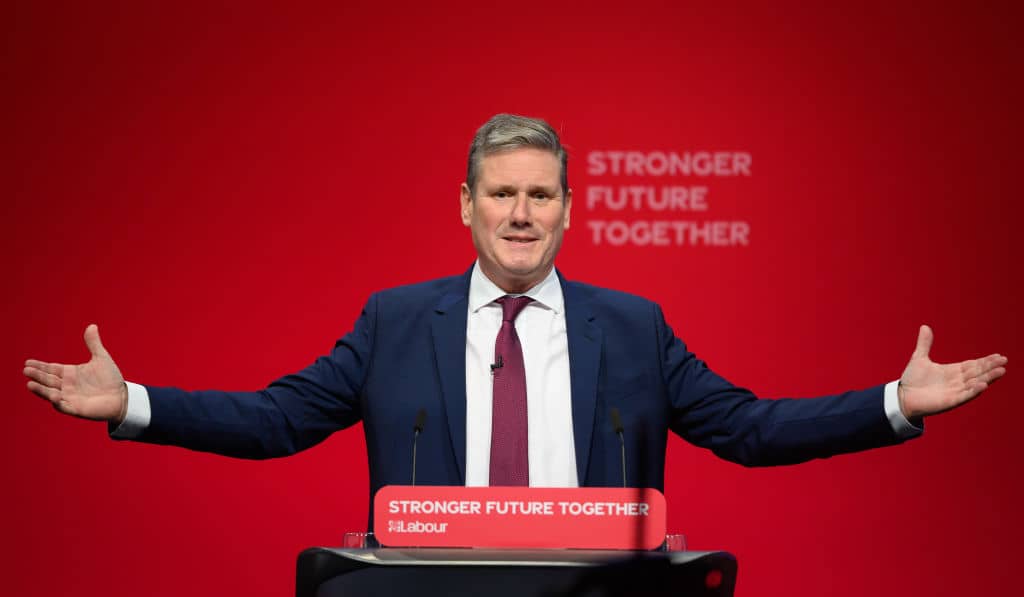Carole Vincent briefly became the unexpected poster girl of Labour’s remaining Corbynites when she heckled Keir Starmer during his leader’s speech. For her pains, Vincent’s voice was drowned out when many (but not all) in the conference hall stood to applaud Starmer and show their support for him: she even gave the Labour leader the chance to declare that while she and others were shouting slogans, he wanted to change Britain.
The Labour activist was later interviewed and outlined her beef with Starmer, one shared by many of those who like her swelled Labour’s ranks during Jeremy Corbyn’s leadership. Starmer, she said, should do more to challenge the government, promise to pay workers more, and generally stop moving Labour to the right.
Vincent’s political biography fitted that of many other Corbynistas. Now in her sixties, she left the party in disillusion during the Tony Blair years to join a more radical alternative, in her case George Galloway’s Respect.
Vincent’s political biography fitted that of many other Corbynistas
For the likes of Vincent, Corbyn promised to finally transform Labour into a socialist party, and his terrible failure at the 2019 election – followed by the inability of his favoured candidate to succeed him as leader – have been bitter and disorientating blows. So far as they are concerned, Starmer is taking Labour further and further away from the Promised Land and they can do very little about it.
Labour has never been a socialist party, if by that is meant an organisation intent on replacing capitalism with a wholly different social and economic order. But it has always been, as Tony Benn noted, a party with socialists in it; and so, it’s ultimate purpose has often been fraught with tension. For the most part socialists have been marginal figures, but during periods when the parliamentary leadership has failed to deliver power their influence has increased.
And in 2015, the apparently impossible happened when Corbyn became leader. The ensuing Corbynism was a complex beast: many followers were committed to the parliamentary road to power. But others believed in turning the party into a social movement to challenge capitalism from the grassroots, and so transform how people did politics.
The ever-smiling Corbyn gave this movement of older Marxist pragmatists and younger New Age utopians a coherence it otherwise lacked. To them the 2017 election was a moral victory, a vindication: John McDonnell even said that had the campaign lasted a few more days Corbyn would have been prime minister. But in contrast they denied the crushing disaster of 2019 was their fault, it was nothing to do with a manifesto with too many promises and a leader lacking credibility: they blamed it on Brexit and the demand of wreckers like Keir Starmer for a second referendum. Their immediate response to that defeat – the party’s worst since 1935 – was that Labour needed to double down on Corbynism and not abandon it.
This remains the position of most today. There is little sense many Corbynites recognise the hard choices any Labour leader wanting to improve the party’s electoral prospects has to make, especially given how low so many voters regard its ability to manage the economy. From this position of high socialist principle, they can sometimes make valid criticisms of Starmer’s missteps since becoming leader. But should they succeed in undermining the Labour leader to such an extent he is toppled before the next election it is unlikely members will choose a candidate whose approach will be much different to his. For however bad Corbynites believe Starmer to be, most members think he is doing a better job than Corbyn and more (albeit narrowly) prioritise winning power over remaining principled.
Corbynites have just two alternatives, the classic ones of Exit or Voice. There are those like Carole Vincent who have loudly voiced their criticisms of Starmer, but like most previous Labour leaders he is institutionally insulated from them, especially now Len McCluskey no longer leads Unite. The other is exit, something she and many others have tried before and with Labour’s membership now at about 400,000, down by 100,000 from its peak under Corbyn, it is clear many have already taken that route.
There are plenty of far-left alternatives willing to welcome them on board. But at most these can merely embarrass Starmer, and sometimes not even that. In the Hartlepool by-election it was not the Northern Independence Party that did Labour damage, but the Conservatives; and in Batley and Spen, for all his bluster, George Galloway’s Workers’ Party of Britain failed to stop Labour retaining the seat.
Like the blinded and shorn Samson in the Temple, Corbynites can, for now, do little but damage the current Labour leader – indeed, any Labour leader – in the hope this will somehow help them recapture the party in the future. Yet in the short-term, this only succeeds in improving the prospects of Boris Johnson’e re-election at the next general election.






Comments